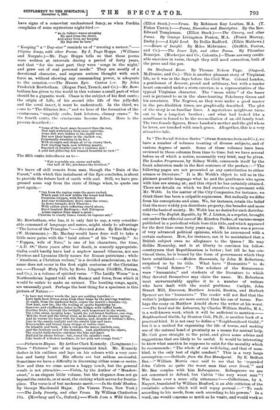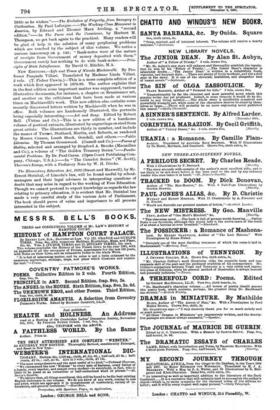In " The Social Science Series " (Swan Sonnenechein and
Co.), we have a number of volumes treating of diverse subjects, and of various degrees of merit. Some of these volumes have been reviewed in these columns from time to time, but we have several before us of which a notice, necessarily very brief, may be given. The London Programme, by Sidney Webb, commends itself by the frank admission made in the first sentence of the preface :—" The following pages are not presented as any contribution to either science or literature." It is Mr. Webb's object to tell us in the plainest possible language what he and the gentlemen who agree with him are aiming at ; and this object he has certainly attained. There are details on which we find ourselves in agreement with Mr. Webb. In the matter of the City Companies, for instance, we think there has been a culpable supineness. But radically we differ from his conceptions and aims. We, for instance, retain the belief that the more widely you distribute property, the broader and more solid the basis of society. Mr. Webb has no desire for such distribu- tion.—The English Republic, by W.J. Linton, is a reprint, brought out under the editorial care of Mr. Kineton Parkes, of various essays published in a periodical which bore this title, and which appeared for the first time some forty years ago. Mr. Linton was a person of very advanced political opinions, which he announced with a. certain rashness. How, for instance, can it be maintained that a British subject owes no allegiance to the Queen ? He may dislike Monarchy, and is at liberty to convince his fellow- countrymen that Republicanism is better ; but till he has con- vinced them, he is bound by the form of government which they have established.—Modern. Humanists, by John M. Robertson, surprised us by its title. What have " Humanists " to do with " Social Science " ? The scholars of the Renaissance were " humanists," and students of the literature to which they devoted themselves may claim the name. Mr. Robertson most unwarrantably applies it to a number of writers who have dealt with the social problems. Carlyle, John Stuart Mill, Emerson, Matthew Arnold, Ruskin, and Herbert Spencer are his " humanists." The reader will not find that the writer's judgments are more correct than his use of terms. Per- haps the essay on Matthew Arnold shows the writer at his worst. —The Land and the Labourers, by Charles William Stubbs, M.A., is a well-known work, which it will be sufficient to mention. Neighbourhood Guilds, by Stanton Coit, Ph.D., is another book of a practical kind. It is not easy to define a "Neighbourhood Guild ;" but it is a method for organising the life of towns, and making use of the natural bond of proximity as a means for mutual help. Mr. Coit goes straight to the point, and gives some advice and suggestions that are likely to be useful. It would be interesting to know what sanction he supposes to exist for the morality which he recommends : " The whole of our well-being, and that of man- kind, is the only test of right conduct." This is a very large assumption.—Outlooks from the New Standpoint. By E. Belfort Bax.—" William Morris once said to me that he regarded John Calvin as quite the worst man that ever lived," and Mr. Ban couples with him Robespierre. Robespierre we are not concerned to defend, but Calvin "the very worst man" ! Was there ever a more. silly utterance ?—Collectivism, by A. Naquet, translated by William Heaford, is an able criticism of the socialistic scheme which will well repay perusal :—'" To each according to his needs, from each according to his powers.' In a word, one would consume as much as he wants, and would work as little as he wishes."—The Evolution of Property, from Savagery to giviinsation. By Paul Lafargue.—The Working-Class Movement in America, by Edward and Eleanor Marx Aveling, a "second edition."—In The Purse and the Consciznce, by Herbert M. Thompson, we get back again to the practical. Many readers will be glad of help in the solution of many perplexing problems which are touched by the subject of this volume. We notice a curious inaccuracy on p. 143: " Bank-notes were of the nature of receipts from Government of money deposited with them." Government surely has nothing to do with bank-notes.—Prin- ciples of State Interference. By David G. Ritchie, M.A.



















































 Previous page
Previous page